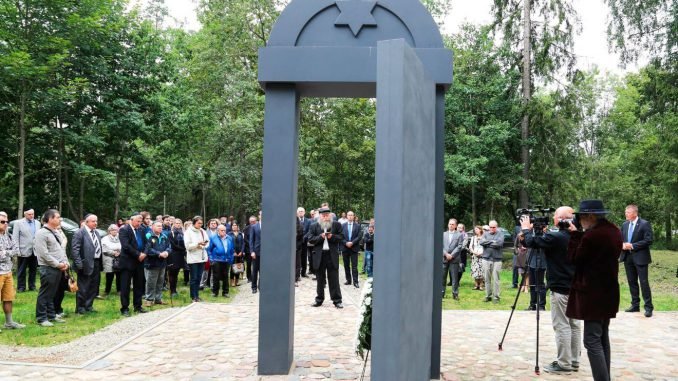
The vast majority of Lithuania’s more than 200,000 Jews were killed during the Second World War, mostly between June and December of 1941 when the country was occupied by Nazi Germany. Until that time, Šeduva, also known as Shadeve or Shadova, had had a unbroken Jewish presence since the fifteenth century. By the beginning of the twentieth, Jews made up around two thirds of the township’s population. Although a fire destroyed much of the shtetl during World War I, and a significant number had already left and would continue to leave in search of a new life abroad, Jewish life flourished there until the end. Following the tumultuous annexation of Lithuania by the Soviet Union in 1940, German forces captured Šeduva on the 25th of June, 1941. Within a matter of days, its Jews were forced into a ghetto in the nearby village of Pavartyčiai. Two months later, on the 25th of August, 1941, Nazi occupiers and their local collaborators killed more than 650 of its occupants in nearby Liaudiškiai and Pakuteniai forests.
Tuesday’s commemoration, organised by the Šeduva Jewish Memorial Fund, paid tribute to the lives lost. The whole-day event consisted of a group visit to three murder sites and the recently rehabilitated Old Jewish Cemetery, followed by a Catholic Mass, and a song concert in Yiddish.
At the three murder sites, which are also mass graves, prayers were intoned and Kalev Kralin, Chief Rabbi of Lithuania, said kaddish, a ritual of mourning in the Jewish religion. Attendees were invited to place a stone at each memorial, as per Jewish custom. One descendant of former inhabitants of Šeduva had brought special remembrance stones from Israel. Prime Minister Algirdas Butkevičius and the Israeli Embassy’s representative, Efram Hochstetler, were amongst those given these to lay.
In addition to dignitaries and descendants, dozens of members of Šiauliai’s and Lithuania’s Jewish communities attended, along with a considerable number of Šeduva locals and others. Many wore a six-pointed star in yellow cloth reminiscent of those required to be worn by Jewish people during World War II. At the mass later in the day, some found themselves inside a Catholic church for the first time, and mention was made of a Šeduva priest who in 1941 tried to convert some local Jews to Christianity in order to save them, and who had hid a Jewish woman in the church’s cellar.
Of the Prime Minister’s participation, Šeduva Jewish Memorial Fund founder Sergey Kanovich was appreciative, saying “I do not know of many politicians who would come and ride dirty roads for four hours and participate in prayers without being offered the possibility to make a speech.” Such high-profile support “sends the right message to society and the political elite,” Kanovich said, but he also emphasised that paying respect to Jewish people murdered in World War II is an “individual act of morality” that “does not and should not happen in front of a microphone”. He hopes commemorations will take place at all the mass graves of Jews dotted across Lithuania, “no matter if it happens with or without dignitaries. It is enough that just one or two people would come, light a candle and pray.”
At a reception following official proceedings, visitors from near and far swapped family stories and shared memories of old Šeduva handed down through generations. David Pincus, a British citizen of advanced years who came to Lithuania specially for the event, spoke of how his Jewish ancestors emigrated from Šeduva to Cape Town in the late nineteenth century to escape economic hardship and the spectre of Russian pogroms. He described the joy he felt when, upon travelling to South Africa in the 1990s to trace his roots, he discovered that his ancestors had named their farmstead near Bloemfontein “Shadova” in honour of the Lithuanian shtetl. To this day, Pincus says, the workers there call it that. “I was so excited about this, the first time anywhere in the diaspora has been named after a shtetl in Lithuania or Poland or Germany,” he said. Since Lithuania’s independence from the Soviet Union Pincus has made several pilgrimages to the farmstead’s original namesake. “Although I was brought up in England and I support the country of my livelihood, my Judaism I carry in my heart wherever I go.”

Be the first to comment